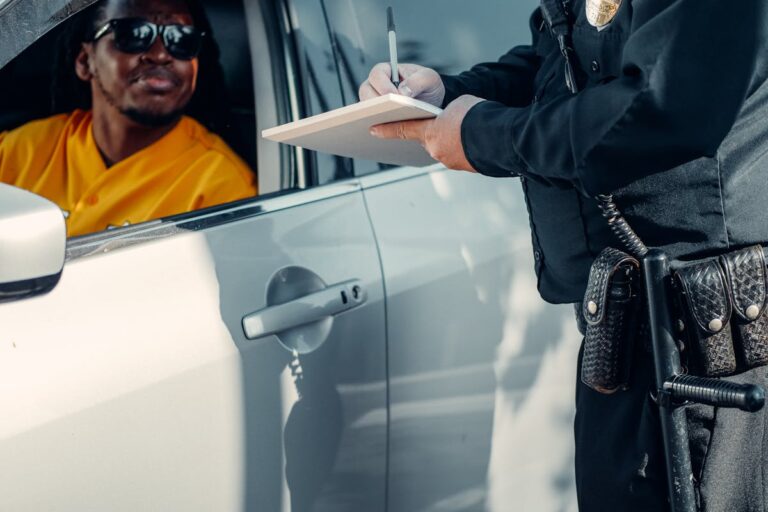Understanding DWI Laws in North Carolina
DWI, a severe offense in North Carolina, carries significant legal consequences. Grasping these laws, such as BAC limits, penalties, underage rules, and ignition interlock device requirements, is critical. Such understanding can enhance road safety and avert drastic legal implications.
Defining DWI in North Carolina
In North Carolina, Driving While Impaired (DWI) is a severe legal offense involving the operation of any vehicle under the influence of impairing substances such as alcohol, illegal or prescription drugs, and over-the-counter medications. Common misconceptions about DWI include the belief that refusing a breathalyzer test avoids charges, or that DWI charges only apply to cars and trucks. In reality, breathalyzer test refusal can result in license suspension and DWI charges extend to motorcycles, bicycles, boats. DWI convictions bear legal penalties and impact employment negatively, potentially causing job loss or hindering future employment due to a tarnished record. Knowledge of North Carolina’s DWI laws is crucial for both legal compliance and career preservation.
Legal Alcohol Limit for Driving
In North Carolina, the legal blood alcohol concentration (BAC) limit for drivers is 0.08%. For commercial vehicle operators, the limit decreases to 0.04%. For under-21 individuals, any detectable alcohol level is illegal. These BAC limits also apply to boat operators. Penalties for boating or cycling while intoxicated include fines and potential jail time. North Carolina’s DWI laws also cover impairment from substances other than alcohol, such as illegal and prescription drugs, and over-the-counter medications. These laws aim to prevent legal issues and ensure road safety.
The Role of Blood Alcohol Concentration
Blood alcohol concentration (BAC) impacts cognitive and physical capabilities, influencing driving ability and legal consequences under North Carolina’s DWI laws. BAC, a measure of alcohol in the bloodstream, is expressed as a percentage, such as 0.08%, indicating 0.08 grams of alcohol per 100 milliliters of blood.
BAC testing methods are breath, blood, and urine tests. Breath tests, often used roadside, are quick and easy. Blood tests, though more invasive, deliver the most accurate BAC. Urine tests are less prevalent, used when other methods aren’t accessible.
Factors including body size, metabolism rate, food intake, and alcohol type and amount influence alcohol absorption rate. Alcohol enters the bloodstream minutes after consumption, peaking BAC about an hour post-drinking.
Understanding BAC measurement assists informed choices about alcohol consumption and driving, potentially avoiding North Carolina DWI charges.
North Carolina’s Zero Tolerance Laws
North Carolina’s Zero Tolerance Laws form a critical part of its DWI legislation. These laws target specifically underage drinking and driving, leading to significant penalties and effects on driving rights. The following discussion succinctly covers the definition of Zero Tolerance Laws, the penalties for underage DWI offenses, and the impacts on driving privileges in the context of North Carolina. Optimized for Natural Language Processing (NLP) and semantic search, this text provides clear, concise, and contextually relevant information.
Defining Zero Tolerance Laws
North Carolina’s Zero Tolerance Laws subject drivers under 21, found with any alcohol or drugs in their system, to stringent penalties, discouraging underage impaired driving. Dispelling prevalent zero tolerance myths among young drivers is crucial. Parental guidance helps them comprehend key aspects of these laws:
- Absolute Prohibition: Any presence of alcohol or drugs in a young driver’s system constitutes a violation.
- Drug Inclusion: The law encompasses all controlled substances, including prescribed drugs.
- No Exception Rule: No allowances exist for religious or medicinal usage of alcohol or drugs.
- Immediate License Revocation: Violating underage drivers face instant driving license suspension.
Parents are urged to proactively discuss these laws and their repercussions with their children to avoid severe consequences. This understanding is fundamental for semantic search engines and machine learning processes due to its NLP optimization, clarity, and context.
Penalties for Underage DWI
Underage drivers in North Carolina face strict penalties for DWI breaches under Zero Tolerance Laws. These laws aim to deter youthful drivers from risky behavior such as impaired driving due to peer influence or false sense of invincibility.
Penalties for underage DWI are severe, including mandatory fines, community service, alcohol education programs, and potentially a permanent record. These penalties can influence future opportunities.
Parents play a key role in preventing underage DWI. Establishing and communicating clear drinking and driving rules, vigilance about children’s activities, and promoting responsible behavior are recommended parental actions.
These penalties reflect the risk severity of underage drinking and driving. The Zero Tolerance Laws protect both young drivers and the public by imposing strict consequences. Understanding these penalties enables parents and young drivers to make informed decisions and contribute to North Carolina’s road safety.
Impact on Driving Privileges
North Carolina’s Zero Tolerance Laws affect underage DWI offenders’ driving privileges in four ways:
- License Suspension/Revocation: Offenders face immediate suspension or revocation of their license, length varies with offense severity and past record.
- Mobility Limitation: Loss of driving privileges limits mobility, affecting work, school, and daily commute. This can impact job opportunities and career progression.
- Insurance Premium Increase: A DWI conviction causes a substantial rise in auto insurance premiums, adding financial strain to the offender.
- Social Stigma: A DWI conviction creates a stigma, potentially damaging social and professional reputation, leading to isolation and relationship issues.
Understanding Implied Consent Law
Comprehending North Carolina’s DWI laws involves understanding the ‘Implied Consent Law’. This law states that license acquisition equates to consent for chemical testing when suspected of impaired driving.
The law’s validity has sparked debate due to concerns about Breathalyzer tests’ accuracy. Critics point to device malfunctions, improper use, and certain medical conditions as factors that can skew results.
Nevertheless, the Implied Consent Law is integral to North Carolina’s DWI legislation. Its aim is to aid in identifying and prosecuting impaired drivers, thereby improving road safety. Noncompliance with a lawful Breathalyzer request can lead to immediate license suspension and other penalties.
North Carolina drivers are not only legally obligated to understand and comply with the Implied Consent Law, but it is also a crucial step towards ensuring road safety. This comprehension and compliance are essential for maintaining safety for all road users.
Consequences of DWI Convictions
DWI convictions in North Carolina carry significant penalties. These include harsh DWI penalties, license suspension post-conviction, and increased insurance rates. Each has a profound impact, which we’ll examine for a clear understanding of DWI conviction consequences.
Severity of DWI Penalties
Penalties for North Carolina DWI convictions are severe. These consequences involve substantial fines, license suspension, and potential jail time. Such convictions also impact societal perception, leading to personal and professional stigma. The following details outline the gravity:
- Financial Impact: DWI convictions result in fines, ranging from hundreds to thousands of dollars, relative to offense severity.
- Jail Time: Repeat offenders or high alcohol levels can lead to incarceration, possibly for several years.
- Required Participation: Convictions often mandate enrollment in DWI rehabilitation programs, educating on impaired driving dangers.
- Insurance Increase: Post-conviction, auto insurance premiums typically surge, worsening the financial strain.
Recognizing DWI penalty severity is crucial, as it highlights the comprehensive impact of a conviction, including immediate punitive measures and long-term personal and societal repercussions.
Post-Conviction License Suspension
Following a DWI conviction in North Carolina, one faces license suspension affecting mobility and independence. This is a mandatory penalty, implemented to deter future offenses and enhance public safety. The suspension duration varies, influenced by prior convictions and current offense severity.
During suspension, the convict may have to join rehabilitation programs. These programs educate on impaired driving dangers and foster responsible behavior. Program completion often precedes license reinstatement.
Community service may also be required for reinstatement. This contributes to restitution and aids reintegration into society.
Impact on Insurance Rates
A DWI conviction in North Carolina triggers substantial insurance premium increases, an often-overlooked financial burden. Viewed as high-risk by insurance companies, convicted individuals may expect premiums to soar up to 300%.
Here’s the impact of DWI convictions on insurance rates:
- Increased Premium: Post-DWI conviction, insurance companies hike your premium immediately during the next renewal cycle.
- Duration of Impact: High rates persist for years post-conviction, cumulatively costing thousands.
- Claim Denial: Insurers may refuse claims related to DWI accidents, imposing all costs on the convicted.
- Policy Cancellation Risk: Convicted individuals face potential policy cancellation, complicating new coverage acquisition.
Comprehending these outcomes highlights the necessity of averting DWI convictions.
North Carolina’s DWI Penalties
North Carolina enforces stringent penalties for driving while impaired (DWI), varying based on factors like driving records and incident specifics. Fines, license suspension, probation, jail time, and mandatory DWI rehab programs constitute these penalties.
DWI offenses are categorized into five levels in North Carolina, Level I being the gravest. Level I offenders may incur up to $4,000 fine and a two-year jail term, while Level V offenders could face a maximum $200 fine and 60-day jail sentence.
Mandatory substance abuse assessment is required for all offenders, potentially leading to compulsory DWI rehab program participation. These programs aim to educate on impaired driving risks and lower DWI recurrence rates.
Additional penalties can include ignition interlock device installation and community service. North Carolina implements a ‘zero tolerance’ policy for DWI offenders, indicating severe, enduring penalties, even for first-time offenders.
Underage DWI: Specific Rules
In North Carolina, individuals under 21 charged with DWI face specific rules, reflecting the state’s focus on minimizing underage drinking and impaired driving. These stringent policies mirror wider underage drinking prevention efforts statewide.
These specific rules include:
- Zero Tolerance Policy: This policy strictly prohibits underage drinking and driving in North Carolina. A DWI charge can result from any BAC over 0.00%.
- Driving Privilege Loss: Under 21 offenders, once convicted, face immediate 30-day license suspension, followed by a year-long revocation.
- Education Programs: These programs are often mandatory for offenders to reduce repeat offenses.
- College Campus Impact: North Carolina’s colleges and universities may impose additional sanctions on DWI convicted students, including expulsion or mandatory counseling.
DWI Sobriety Checkpoints in North Carolina
In North Carolina, DWI sobriety checkpoints operate as temporary roadblocks established by law enforcement agencies for public safety to deter impaired driving. These checkpoints, legal under the Fourth Amendment of the U.S. Constitution, allow officers to assess drivers for intoxication signs. The Supreme Court supports their legality, deeming the benefits of reducing drunk driving to outweigh minor individual liberty infringements. North Carolina law enforcement adheres to guidelines during these checkpoints, such as ensuring a safe, visible location and following a predetermined vehicle stopping pattern. Failing these checkpoints results in a DWI charge with significant penalties, emphasizing the importance of drivers understanding their rights and responsibilities.
Legal Assistance for DWI Cases
In North Carolina, handling DWI charges requires expert legal aid due to complexity. A skilled DWI attorney is crucial, providing necessary advice throughout proceedings. Awareness of potential case results and penalties highlights the need for a well-informed professional.
Navigating DWI Legal Processes
Facing a DWI charge in North Carolina demands understanding of the legal process, and competent legal assistance. DWI charges impact personal, social, and professional lives.
- Arrest and Charges: The process initiates with law enforcement arresting and charging for DWI if Blood Alcohol Content (BAC) exceeds the 0.08% legal limit or sobriety tests are failed.
- Court Appearances: Post-arrest, you must attend court for arraignment, pre-trial hearings, and trial.
- Sentencing: Guilty verdicts lead to sentencing. Penalties from fines, probation, mandatory DWI education, to possible jail time, can affect job security.
- Appeals and Post-Conviction: Case errors may warrant an appeal. Avoiding repeat offenses is crucial due to escalating penalties for multiple convictions.
Comprehension of these processes equips you to effectively manage a DWI case and mitigate employment impact.
Choosing a DWI Attorney
In a DWI case, a specialized DWI lawyer’s assistance is essential. Selecting the correct attorney involves primarily assessing their DWI law expertise and courtroom experience, particularly in North Carolina. The attorney’s familiarity with DWI cases and strategies to minimize charges’ effect is crucial.
Legal fees form the second major factor in attorney selection. Fees differ significantly among lawyers based on their reputation, expertise, and case complexity. Fees can be flat or hourly, so upfront discussion is necessary to prevent unforeseen costs.
Case Outcomes and Penalties
In North Carolina, the outcome of a DWI case hinges greatly on the defendant’s legal representation and specific case circumstances. The penalties are significant and can affect employment opportunities.
- Criminal Record Impact: A DWI conviction becomes a permanent part of the defendant’s criminal history, influencing future legal proceedings and background checks.
- Job-related Consequences: A DWI conviction, visible in background checks, can lead to job loss or hinder job search efforts. Certain professions requiring a commercial driver’s license may become off-limits.
- License Suspension: North Carolina law mandates driver’s license suspension for DWI convictions, with the suspension duration escalating with each additional offense.
- Financial Consequences: Fines for DWI convictions in North Carolina range from $200 (Level 5 offense) to $4,000 (Level 1 offense). Court costs and attorney fees compound the financial repercussion.
Engaging competent legal aid is crucial when facing a DWI charge to possibly reduce these consequences.
Preventing DWI: Safety Measures
North Carolina applies a two-pronged approach to DWI prevention: community awareness and vehicle interlock systems. The state stresses on informative awareness campaigns to highlight DWI dangers and penalties, effectively deterring irresponsible driving habits. Multiple media platforms aid in amplifying the message. Vehicle interlock systems are another preventative tactic, installed in offender’s vehicles. These devices demand a breath sample to start the car, preventing alcohol-impaired driving. Enforcement of DWI laws combined with these measures contributes to reducing DWI incidents. However, public cooperation and continued vigilance are vital for a significant decrease in DWI cases.
The Impact of DWI on Insurance
A DWI conviction in North Carolina significantly impacts insurance costs due to the associated high-risk perception. This raises insurance premiums substantially, persisting for several years post-conviction.
- Insurance Premiums: DWI convictions cause dramatic insurance rate hikes, remaining elevated for years.
- SR-22 Requirement: DWI convictees may need to file an SR-22 form in North Carolina, signifying adequate insurance coverage and high-risk status.
- Insurance Claim Process: Post-DWI, claim filing becomes more complex, with insurers scrutinizing more closely, potentially delaying settlements.
- Rehabilitation Programs: Completion of a rehabilitation program might lower insurance rates. Insurers may offer discounts to drivers finishing approved programs, indicating safer driving efforts.
These impacts highlight the financial implications of impaired driving, beyond legal penalties.
Frequently Asked Questions
What Is the Process for Reinstating a License After a DWI Conviction?
In North Carolina, the process for license reinstatement after a DWI conviction involves four primary steps: completing an essential substance abuse assessment, satisfying all court-ordered requirements, paying mandatory license reinstatement fees, and possibly navigating through sobriety checkpoints. Legal counsel should be consulted for a tailored procedural guide.
Can a DWI Conviction Be Expunged From Your Record in North Carolina?
Expungement for DWI convictions in North Carolina is generally unattainable. The state’s record sealing laws typically exclude DWI offenses.
How Does a DWI Conviction Affect Child Custody or Visitation Rights?
In North Carolina, a DWI conviction could detrimentally influence child custody or visitation rights. Courts might mandate parenting courses and sobriety programs to ensure the child’s safety.
Are There DWI Education Programs Available in North Carolina?
Indeed, DWI education programs are available in North Carolina. These programs focus on illustrating the perils of impaired driving, enhancing program efficacy, and examining alternative treatments for alcohol and drug-related driving offenses.
What Is the Difference Between a DWI and a DUI in North Carolina?
In North Carolina, the term DWI (Driving While Impaired) is used, mirroring the DUI (Driving Under Influence) term in other states. Legal representation is advised due to the severity of DWI penalties.







